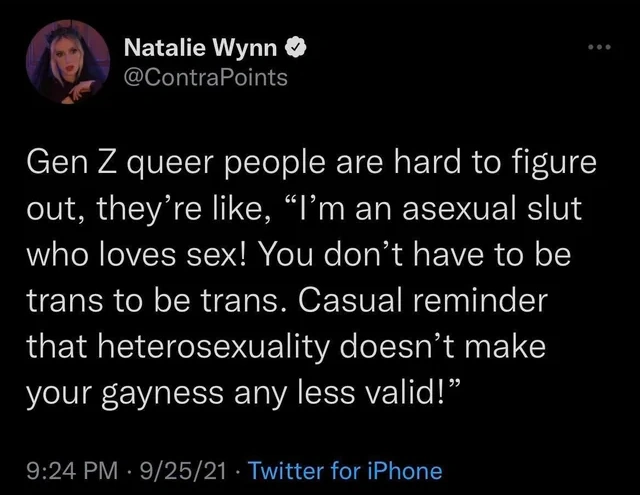LGBT people tend tend to view self-identification as the ultimate arbiter of identity. That is, if you say you’re a lesbian, you are a lesbian, even if you’re occasionally attracted to men. If you say you’re asexual, you are asexual, even if you occasionally have sex. If you say you’re bi—well, you get the idea.
I used to think this was all just hippie bullshit, or at the very least, one of those things we all pretended was true to avoid getting yelled at on Tumblr. If you’re attracted to both men and women, aren’t you bisexual by definition? Why should you get to opt out of a purely descriptive label? Sure, maybe some of these categories are historically contingent, but that doesn’t mean you get to redefine them as you see fit.
This frustration is best summed up in a now-deleted ContraPoints tweet:

I changed my mind on this issue a few years ago, when I started thinking more about signaling (long story short, I was reading a lot of rationalist blogs at the time). If labels express what you want to communicate to other people—which might depend on other factors than raw attraction—then the self-ID view makes perfect sense.
Let’s say you’re a woman who’s a 5 on the Kinsey scale—i.e. mostly, but not exclusively, attracted to other women. Depending on your social milieu and personal preferences, it might be worth it to round that off to “lesbian” if the unwanted attention from men outweighs the loss in dating opportunities. Everybody wins here: you receive less attention from people you don’t want to date, straight and bi men can avoid wasting their time, and queer women get a clearer signal of potential interest (god knows they need it).
(If you do this, I think you also have an obligation to reject any man who asks you out, even if you like him back. Otherwise, a few straight men might get the idea that lesbians will occasionally say yes when guys hit on them, and that’s not good for anybody.)
Similarly, say you’re a Kinsey 3 man with homophobic parents, and in light of this, you’ve elected to only date women. As a bi man, I might even slightly prefer that you identify as straight, because I’d rather not get my hopes up if you happen to be my type. Though you’re still free to call yourself bi—“I have experienced homophobia and can speak with some authority on it” and “you can feel safe coming out to me” are worth signaling too.
I’ve found myself applying this logic to other things. “Social democrat” and “market socialist” are both reasonable descriptions of my politics, but if I call myself a socialist, people think I’m a DSA type, and I cannot stand those guys. So “social democrat” it is. By the same token, I call myself “atheist” instead of “agnostic” because a lot of self-described agnostics are vaguely spiritual people who take a “maybe it’s true, maybe it isn’t” approach to religion. While I’m not willing to rule out the existence of a god-like entity, I want people to know that I think their god is fake.
Is there a term for labeling yourself this way? I feel like there should be. “Denotation vs connotation” and “thick vs thin description” get most of the way there but don’t quite fit. If you know a word for this, please let me know!